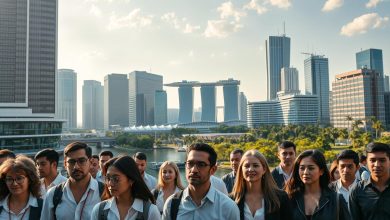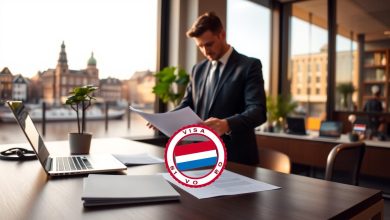Securing a Visa Sponsorship in Rotterdam: A Complete Guide
Anúncios
Rotterdam stands as a thriving hub for global professionals and long-term visitors seeking opportunities in Europe.
Its dynamic economy and strategic location make it a prime destination for those aiming to build careers or establish roots abroad. Navigating the legal pathways here requires clarity, preparation, and an understanding of regional policies.
The process to secure legal entry varies widely based on nationality, employment status, and intended stay duration. Applicants must provide detailed documentation, including proof of financial stability and sponsorship commitments. Strict adherence to timelines ensures smoother processing and reduces delays.
Dutch immigration law blends EU frameworks with national requirements, emphasizing transparency and fairness. Short-term permits differ sharply from long-term residency options, each demanding tailored strategies. Knowledge of these distinctions helps applicants avoid common pitfalls.
This guide outlines essential steps—from eligibility checks to final approval—highlighting how thorough preparation unlocks access to jobs, social services, and pathways toward naturalization. Proper compliance isn’t just about legality; it’s a gateway to stability in a vibrant international community.
Overview of Visa Sponsorship in Rotterdam
For stays shorter than 90 days, demonstrating daily funds or securing a sponsor is mandatory. Travelers who cannot show access to €55 per person daily must partner with a resident to meet financial requirements. This system balances flexibility with accountability, ensuring visitors have reliable support while protecting public resources.
The Benefits of Securing Sponsorship
Guaranteed financial backing removes the burden of proving personal savings. Sponsors provide not just funds but also housing assistance and guidance through local bureaucracy. Many find this invaluable when adapting to unfamiliar systems.
Accountability measures ensure sponsors uphold legal obligations for their guests’ conduct and expenses. This structure benefits both parties—visitors avoid financial stress, while hosts contribute to responsible immigration practices.
Understanding Rotterdam’s Immigration Landscape
Local policies align with national frameworks prioritizing controlled entry for legitimate purposes like family reunification or cultural exchange. The Immigration and Naturalisation Service manages applications uniformly, though processing timelines may vary slightly by region.
Applicants should research specific documentation needed for Rotterdam’s offices to prevent delays. Clear communication with sponsors and early preparation streamline the approval process for temporary residence permits.
Eligibility and Sponsorship Requirements in the Netherlands
Understanding eligibility criteria forms the foundation for successful sponsorship applications in European destinations. Sponsors must meet strict financial and legal standards to guarantee applicants’ stability during their stay. Three primary categories define sponsor qualifications: employed workers, self-employed professionals, and pension recipients.
Employment-Based Sponsorship
Salaried workers need employment contracts valid for at least 12 months beyond their visitor’s permit application date. This ensures consistent income to cover housing and living costs. Required documents include:
- Photocopied employment agreement with company letterhead
- Recent pay stubs showing minimum income thresholds
Self-Employed and Pension Sponsors
Business owners must provide Chamber of Commerce registration and tax records proving profitability. Pension recipients submit official statements confirming 12+ months of guaranteed income. Both groups face additional scrutiny to confirm long-term financial reliability.
All sponsors must hold valid residence permits or EU citizenship. Authorities assess applications holistically—legal status alone doesn’t guarantee approval. Proof of genuine relationships and visit purposes strengthens submissions significantly.
Application Process for Visa Sponsorship Netherlands Rotterdam
Navigating the sponsorship process requires careful coordination between applicants and their supporters. The journey begins with identifying a qualified sponsor who agrees to take financial responsibility. From there, both parties must follow precise steps to ensure compliance with regulations.
Step-by-Step Guide to the Application
First, sponsors must formally agree to support the applicant by completing the required documentation. This initiates a three-phase procedure:
- Submission of the proof of sponsorship form alongside financial evidence
- Verification of documents by immigration officials
- Final decision within 4-6 weeks for most cases
Delays often occur when forms lack signatures or supporting papers. One immigration advisor notes: “Complete submissions reduce processing time by 40% compared to incomplete files.”
Using the Proof of Sponsorship Form
This document acts as the foundation for the entire request. How applicants use it depends on their home country’s travel agreements. Those from visa-exempt nations typically submit it directly with their entry request. Others must include it in their visa application package.
The form demands precise details about:
- Sponsor’s income sources
- Applicant’s planned stay duration
- Relationship between both parties
Errors in these sections frequently lead to requests for additional information. Double-checking entries before submission helps maintain momentum in the approval process.
Required Documents and Work Permit Guidelines
Preparing the correct paperwork forms the backbone of any successful application. Sponsors must gather precise materials based on their employment type and the applicant’s nationality. Missing items often lead to delays or rejections.
Document Checklist for Employed Applicants
Salaried workers need to demonstrate stable income through multiple proofs. Essential items include:
- A photocopy of the employment contract with company letterhead
- Three recent salary statements showing consistent earnings
- An employer declaration confirming job security
All identification photocopies must clearly display citizen service numbers. Blurred or incomplete copies risk rejection during verification.
Documents for Self-Employed and Pension-based Sponsorship
Business owners face stricter documentation rules. Required papers involve:
- Chamber of Commerce registration extracts
- Final income tax assessments from the past year
- Detailed profit-loss statements
Pension recipients must submit official income guarantees. Financial viability remains the key focus for approval.
Work Permit Exceptions for Certain Nationalities
Authorization rules differ sharply across regions. EEA citizens and Swiss nationals don’t need permits for employment. Others face stricter requirements:
- Non-EEA workers typically require permits
- Exceptions exist for high-skilled roles or asylum cases
Applicants should verify their status early to avoid legal complications. Proper preparation aligns with regional policies while saving time.
Financial and Contractual Considerations for Sponsorship
Financial planning forms the cornerstone of successful sponsorship arrangements. Clear documentation and legal agreements protect both visitors and their supporters while meeting regional regulations. Thorough preparation prevents misunderstandings and ensures compliance throughout the stay.
Meeting Daily Expense Requirements
Short-term visitors must demonstrate access to €55 daily per person. Those unable to show personal funds through traveler’s checks or salary slips need sponsors to guarantee this amount. Sponsors must verify their earnings through recent salary slips or business records showing consistent income above obligations.
Immigration officials compare sponsors’ existing financial commitments against proposed responsibilities. This prevents overextension while maintaining accountability. One advisor notes: “Proper budgeting separates successful applications from rejected ones.”
Employment Contracts and Sponsor Responsibilities
Valid employment agreements serve dual purposes—they confirm stable income and job security. Contracts must remain active for at least 12 months after the visitor’s application date. Employers often provide supplementary declarations detailing position stability and salary specifics.
Business owners face additional scrutiny. They submit tax assessments and profit statements to prove enterprise viability. Contractual duties extend beyond finances to ensure sponsored individuals adhere to local laws and departure timelines.
Additional Tips and Best Practices for a Successful Application
Securing approval for international stays demands strategic preparation beyond basic requirements. Attention to detail separates successful submissions from delayed or rejected cases. Below are actionable strategies to strengthen your request while avoiding frequent errors.
Avoiding Common Pitfalls
Mismatched dates across documents rank among top rejection causes. Ensure all forms align perfectly with supporting evidence like bank statements or employment letters. Missing signatures or expired paperwork trigger immediate delays.
Translation oversights also create hurdles. Non-English documents require certified translations—unofficial versions risk rejection. One legal advisor emphasizes: “Accurate translations prove you respect procedural standards.”
Enhancing Your Application with Supporting Evidence
Go beyond minimum requirements. Include flight itineraries, housing contracts, or invitation letters to demonstrate visit legitimacy. These extras address unspoken questions about intentions and reliability.
For family visits, shared photos or communication records strengthen relationship proof. Business travelers benefit from conference registrations or meeting schedules. Consistent financial figures across tax returns and sponsorship forms build credibility.
If you have questions, professional guidance clarifies complex scenarios. Prompt responses to authority requests keep applications moving forward. Thorough preparation transforms uncertainty into confidence.
Conclusion
Navigating international relocation demands preparation and awareness of regional rules. Success hinges on understanding financial thresholds, documentation standards, and sponsor obligations. Applicants must tailor strategies to their unique circumstances while meeting evolving EU frameworks.
The permit process balances flexibility with accountability. Short-term stays often transition to longer-term residence plans, requiring updated applications after initial months. Clear proof of stable income and genuine relationships remains critical at every stage.
Dutch policies prioritize controlled entry without stifling opportunity. Regular updates to requirements mean staying informed is as vital as thorough paperwork. Those who align with both legal and cultural expectations find smoother transitions.
Ultimately, compliance unlocks stability. Whether planning a brief stay or extended residence, meticulous attention to detail transforms complex processes into achievable steps. Preparation today lays the groundwork for tomorrow’s success abroad.
For more information, explore the official visa website mentioned in this article:
You will be redirected to another website
FAQ
What are the primary benefits of obtaining a sponsorship in Rotterdam?
It grants access to long-term residency, work opportunities, and streamlined integration into Dutch society. Sponsorship also simplifies compliance with local immigration laws.
Who qualifies as a sponsor under Dutch immigration rules?
Eligible sponsors include employers offering valid contracts, self-employed individuals with registered businesses, or pension recipients meeting income thresholds set by the Immigration and Naturalisation Service (IND).
How long does the application process typically take?
Processing times vary but generally take 90 days. Delays may occur if documents are incomplete or additional verification is required by authorities.
What financial proof is required for employed applicants?
A recent employment contract, three months of payslips, and bank statements showing consistent income above the IND’s minimum threshold must be submitted.
Are there exceptions to work permit requirements?
Citizens from EU/EEA countries, Switzerland, or those holding a highly skilled migrant permit may bypass additional work authorization under specific conditions.
Can self-employed individuals act as sponsors?
Yes, provided they submit a business registration, annual financial statements, and evidence of sustainable income meeting IND standards for at least 12 months.
What common errors should applicants avoid?
Incomplete forms, expired documents, or insufficient financial proof often lead to rejections. Double-checking requirements with IND checklists reduces these risks.
How can sponsors strengthen their applications?
Including supplementary evidence like tax returns, client testimonials, or a detailed cover letter clarifies credibility and adherence to Dutch immigration policies.
Published on: 24 de July de 2025

Sofia Kamara
Sofia Kamara is the founder of GoldenCred.blog, a platform built to guide students and young professionals in navigating international opportunities. With a background in public policy and international relations, Sofia has spent years helping people secure scholarships, sponsorship visas, and financial planning strategies for studying abroad.
She believes that accessible, accurate information is a powerful tool for change. Her writing combines practical advice with strategic insights, crafted especially for those eager to take bold steps toward education and career development in countries around the world.







